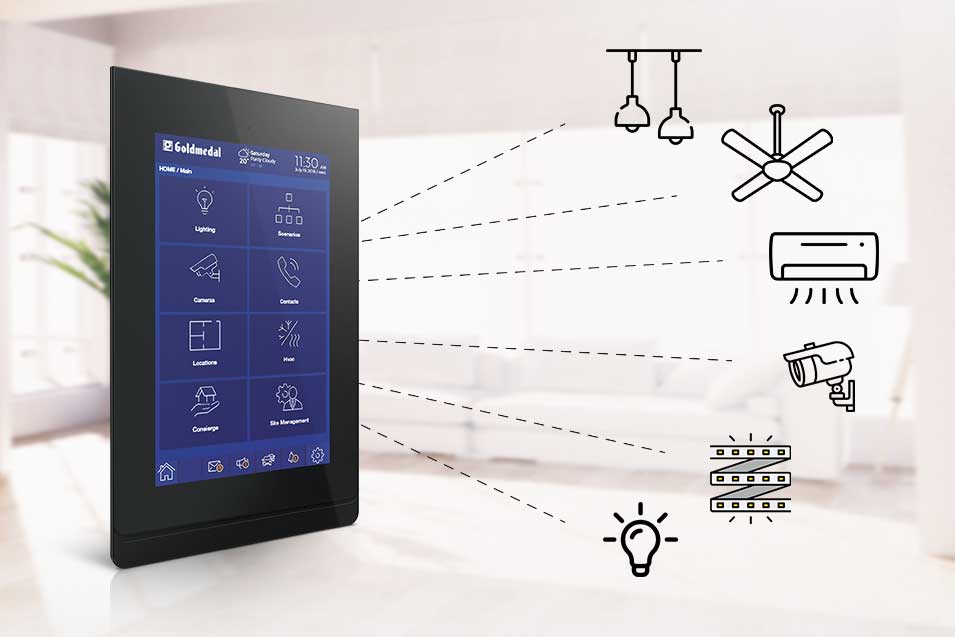Intelligent Home Automation: The Complete Guide to Creating a Smarter Living Space
Estimated reading time: 8 minutes
Key Takeaways
- Intelligent home automation is transforming how we interact with our living spaces, offering unprecedented levels of convenience and efficiency.
- A smart home consists of smart devices, a central hub, and user interfaces that allow for seamless control and automation.
- The integration of technologies like IoT, wireless communication, and machine learning is at the core of intelligent home automation.
- While offering numerous benefits, smart homes also come with challenges like device compatibility and security considerations.
- The future of home living is increasingly smart, connected, and automated, making intelligent home automation more accessible than ever.
Table of Contents
- Intelligent Home Automation: The Complete Guide to Creating a Smarter Living Space
- Key Takeaways
- What Is Intelligent Home Automation?
- The Building Blocks of a Smart Home
- How Does Intelligent Home Automation Work?
- The Benefits of Going Smart
- Popular Automation Ideas
- The Technology Behind the Magic
- Security and Privacy Considerations
- Market Trends and Future Directions
- Overcoming Challenges
- The Road Ahead
- Frequently Asked Questions
The future of home living is here, and it's smarter than ever. Intelligent home automation has transformed from a luxury novelty into an accessible reality, revolutionizing how we interact with our living spaces. In this comprehensive guide, we'll explore how this technology is reshaping our daily lives and why it might be time for you to embrace the smart home revolution.
What Is Intelligent Home Automation?
Intelligent home automation, commonly known as smart home technology (Smart Home Automation Devices: The Ultimate Guide to Making Your Home Smarter in 2025), represents an intricate network of internet-connected devices and automated controls designed to enhance and manage various household functions. This sophisticated system combines hardware, software, and wireless communication to deliver unprecedented levels of convenience, comfort, energy efficiency, and security to homeowners.
The Building Blocks of a Smart Home
1. Smart Devices
At the heart of any intelligent home automation system lies a collection of smart devices. These include:
- Smart lighting systems
- Intelligent thermostats
- Security cameras (Secure Implementation of Automation: Best Tools and Strategies for Small Businesses in 2024)
- Smart door locks (Secure Implementation of Automation: Strategies to Boost Sales Efficiency)
- Connected kitchen appliances
- Environmental sensors
Each of these devices serves as a functional unit, capable of executing commands and gathering valuable data about your home environment.
2. The Central Hub
A home automation hub serves as the brain of your smart home ecosystem. This central controller connects multiple devices, often working with different communication protocols such as:
- Wi-Fi
- Bluetooth
- Zigbee
- Z-Wave
Popular hub options include Amazon Echo, Google Home, and the Wink Hub, each offering unique features and compatibility options.
3. User Interface
Modern smart homes are typically controlled through:
- Smartphone applications
- Web interfaces
- Voice commands
These interfaces provide both remote monitoring capabilities and active management of your home's various systems.
How Does Intelligent Home Automation Work?
The magic of intelligent home automation lies in its seamless integration of various technologies:
Network Connectivity
Devices communicate with each other and a central hub through a dedicated network, creating an interconnected ecosystem that responds to your needs (The Rise of Intelligent Process Automation Solutions: Transforming Business Operations).
Remote Control Capabilities
Whether you're at work or on vacation, you maintain complete control over your home's systems through secure remote access.
Automated Intelligence
The system can:
- Execute scheduled settings (like turning lights on at sunset)
- Respond to environmental triggers (adjusting temperature based on occupancy)
- Learn from your preferences (optimizing settings based on your habits)
- React to voice commands through virtual assistants (Intelligent Agents in AI: Transforming Multi Agent Systems for Business Success)
The Benefits of Going Smart
1. Enhanced Convenience
Automation eliminates repetitive tasks and centralizes control of your home's functions, streamlining your daily routines.
2. Improved Comfort
Smart systems continuously monitor and adjust your environment, maintaining optimal conditions for comfort and well-being.
3. Energy Efficiency
By optimizing heating, cooling, lighting, and appliance use, intelligent automation can significantly reduce energy consumption and associated costs.
4. Advanced Security
Integration of alarm systems, cameras, and smart locks provides:
- Real-time security alerts
- Remote surveillance
- Automated emergency responses
- Access control management
Popular Automation Ideas
Looking for inspiration? Here are some popular ways homeowners are implementing smart technology:
- Light systems that follow natural daylight patterns
- Learning thermostats that adapt to your schedule
- Smart security systems with video doorbells
- Automated appliance scheduling
- Multi-room audio systems
- Smart window treatments
The Technology Behind the Magic
The foundation of intelligent home automation rests on several key technologies:
Internet of Things (IoT)
IoT technology enables devices to communicate and share data, creating a network of intelligent devices working in harmony.
Wireless Communication
Modern systems utilize various wireless protocols to ensure reliable device-to-hub and device-to-device communication.
Machine Learning
Advanced systems employ machine learning algorithms to:
- Predict user preferences (Intelligent Agents in AI: Transforming Multi Agent Systems for Business Success)
- Optimize performance
- Adapt to changing conditions
- Enhance automation efficiency
Security and Privacy Considerations
As with any connected technology, security is paramount. Key considerations include:
- Robust cybersecurity measures to protect personal data (Secure Implementation of Automation: A Guide to Integrating Tools and Optimizing Business Efficiency)
- Regular software updates and patches
- Device compatibility management
- Secure network configurations
Market Trends and Future Directions
The smart home industry continues to evolve rapidly, driven by:
- Decreasing device costs
- Improved user interfaces
- Advanced AI capabilities
- Expanding IoT applications
Beyond residential applications, intelligent automation is finding its way into:
- Commercial buildings
- Healthcare facilities
- Elder care environments
- Energy management systems (Latest Trends in Business Automation: A Complete Guide for 2024)
Overcoming Challenges
While intelligent home automation offers numerous benefits, users should be aware of potential challenges:
- Device compatibility issues between different manufacturers
- Dependence on stable internet connectivity
- Initial setup complexity
- Ongoing maintenance requirements
The Road Ahead
As technology continues to advance, intelligent home automation is becoming increasingly sophisticated and accessible. With improved integration, enhanced security features, and more intuitive interfaces, smart homes are no longer just a luxury but a practical solution for modern living.
Whether you're looking to enhance your home's security, improve energy efficiency, or simply make your daily routines more convenient, intelligent home automation offers a scalable solution that can be customized to your specific needs and preferences.
The future of home living is intelligent, connected, and automated. As these systems continue to evolve and improve, they're not just changing how we interact with our homes—they're fundamentally transforming how we live.
Remember, the journey to a smarter home doesn't have to happen all at once. Start with the features that matter most to you, and gradually expand your system as your needs and comfort level grow. The future of home automation is here, and it's more accessible than ever before.
Frequently Asked Questions
Q: What is intelligent home automation?
A: Intelligent home automation refers to the integration of smart devices and systems that allow for automated and remote control of various household functions, enhancing convenience, comfort, and efficiency.
Q: How does intelligent home automation improve energy efficiency?
A: By optimizing the use of heating, cooling, lighting, and appliances based on real-time data and user habits, intelligent home automation reduces unnecessary energy consumption, leading to cost savings and environmental benefits.
Q: Are there security risks associated with smart homes?
A: While smart homes offer advanced security features, they can be vulnerable to cybersecurity threats if not properly secured. Implementing strong passwords, regular updates, and secure network configurations can mitigate these risks.
Q: Can I start with just one or two smart devices?
A: Absolutely! You can begin your smart home journey with a single device like a smart thermostat or lighting system and gradually add more devices as needed.
Q: Do I need a central hub for my smart home?
A: While a central hub can enhance integration and control, many smart devices can operate independently or connect directly to your home's Wi-Fi network.

